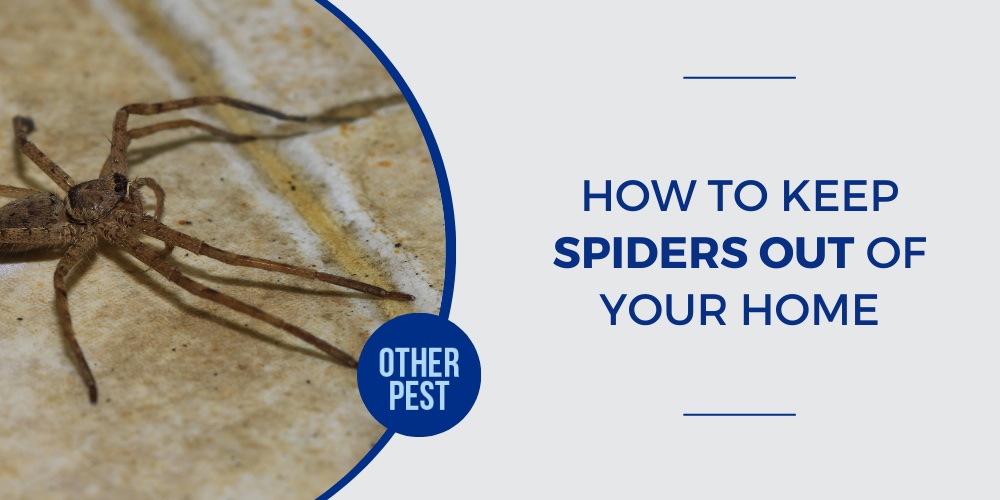Finding spiders in the house and yard can be scary, and clearing out the webs they leave behind can be annoying. Spiders are some of the most feared pests because of their intimidating (creepy) appearance and potentially painful and poisonous bites. They can be found year-round in Arizona but are most active in late summer and fall into early winter. Spiders may also be more noticeable as they grow larger and easier to see toward the end of the year, and their webs also get larger with age. Fortunately, learning how to keep spiders out of your home is easy when you understand their behavior and use the right products.
Why Do Spiders Come Inside?
Spiders tend to come indoors the latter part of the year as it marks the beginning of mating season. During mating season, spiders seek dry, dark, warm places to mate, making the inside of a home the ideal location. Common places for spiders to hide are dark closets, attics, garages and other poorly lit areas with low traffic and protection from the outside elements.
Male vs. Female Behavior
Male and female spiders lead very different lives. Female spiders are stagnant, living in one place almost their entire life. They can do this because of their ability to provide for themselves by trapping insects through their webs. Once a female spider finds a suitable place to live, like a corner in a cozy closet, she will build a web and stay put.
Males, on the other hand, are constantly on the move. They rarely build webs, except during the mating season. Male spiders only need a web to attract a mate, and spiders typically only mate once or twice during their lifetime. The male will create a web during mating season and then go in search of a female spider. When male spiders are in search of a mate it often leads them inside. This explains why we see more spiders inside homes during mating season compared to the rest of the year.
Protecting Offspring
After mating, female spiders put their eggs in a sac made up of strong silk to protect the developing offspring. The number of eggs in the sac varies depending on the species – some species produce thousands of eggs, and some only produce a few. After the eggs are in the sac, it typically takes 2 or 3 weeks for them to hatch.
In the meantime, the female spider must protect her offspring. Depending on the species, female spiders will protect their egg sac by keeping it close to them or hiding it somewhere it won’t be disturbed. Because of the protection houses provide from the outside elements, female spiders often choose to hide their egg sacs inside homes. This is why it’s best to get rid of spiders during mating season before they get the chance to multiply.
4 Steps To Keep Spiders Out
Eliminate Webs
Tearing down and clearing out spider webs as soon as they are found prompts spiders to choose to relocate.
Fill in Gaps Around the Home
Most spiders are small, making it easy for them to enter the home through small cracks. To prevent spiders from coming inside, check and seal small cracks or gaps, blocking potential opportunities to enter. This includes inspecting windows, doors and wall seams closely.
Select Spider-Repellant Plants
There are a number of indoor houseplants that can be kept around the home to ward off spiders and other pests. Some of these plants include eucalyptus, peppermint, basil and lavender. Spiders do not like the scents from these fragrant plants, and will avoid them.
Clean And Declutter
It is important to keep the inside, as well as the outside of the house, clean and decluttered. When there is clutter, spiders have more places to build webs that are undisturbed and out of sight. Spiders enter the home to make it their own because it provides food and shelter. A clean, clutter-free home limits the opportunities and access spiders search for to make a home.
Apply Spray-On Solution
Use a tank sprayer to apply solutions to areas with heavy spider traffic and anywhere you see webs around the home. Pay close attention to wall joints, supporting columns and around light fixtures. After spraying, wait 4-5 days to get remove any remaining spider webs.
Spiders are inconvenient at best and dangerous at worst, but you don’t have to share your home with them. If you are concerned or afraid spiders may be finding a way into your home, come visit Bug & Weed Mart to speak with one of our experienced team members. We have five locations throughout the Valley that can help determine the ideal pest control products for your spider-control needs and show you how to properly apply them. Contact us to learn how you can prevent spiders and keep them outside for good.

